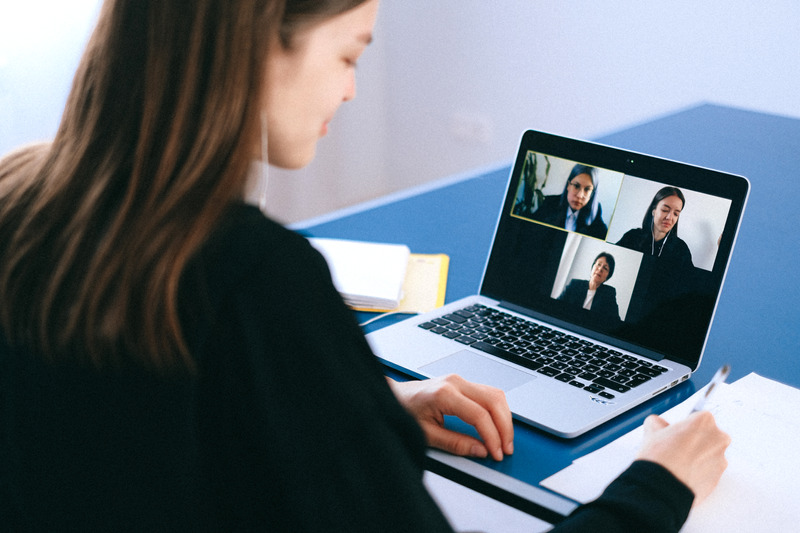“Zoom Fatigue” is a term being used to describe the exhausted feeling one has after a video conference call. During “shelter in place” ?, an estimated 42% of people are now working full time from home. Zoom calls are so draining because we have to focus more intently on the words being said. After all, we don’t have body language to help us out. With various technological glitches, lagging, echoes, and unnatural pauses – our brains can be easily tired from this distorted way of communication. We have to exercise patience and compassion when understanding people through video calls, and not forgetting to extend that to ourselves. Here are some small adjustments to work better remotely.
Zoom Hacks
To counteract “zoom fatigue”, minimize everyone on the screen (exit out of gallery view, enter active speaker view), so you can focus and absorb the information of the person speaking. You can also suppress background noise in Zoom calls, which will cut out distracting noises (typing, TV, fan noise, pets in the background, etc). If you are someone who has to stare at the screen all day and into the night, consider turning on “Night Shift“. The blue light found in LED screens suppresses melatonin production in the brain, which disrupts natural circadian patterns. “Night Shift” will adjust the colors of the screen to the warmer end of the spectrum, limiting the amount of blue light. There is also “Dark Mode” available on both Android and iPhone, which reduces strain on your eyes by making white screens black.
Exercise
Sitting stationary in video conferencing calls are straining to our mental and physical health. Consider adding yoga to your morning routine to prepare your body for the day. Be sure to stretch before and after calls if you can, and take water and tea breaks when you need them. Every half hour, do some simple stretches for your neck, shoulders, arms, and fingers. If you can, do some forward bends and side stretches as well. Don’t sit at home and carry the tension of the workday, transform that stress, and go out into nature! Take a brisk walk if you had a challenging day and need to expend that energy. Take a nice stroll if you want to slow down the pace of the day. On your walks, try to be mindful and appreciative of the nature around you and within you.
Environment
Waking up 5 minutes before a zoom call and taking it in your bed, is not a good recipe for being an active meeting participant. Consider creating a dinacharya, or morning routine to ground yourself and have a more focused and productive workday. Try not to do zoom calls in your bed, because your brain will associate it with working and it will be harder to fall asleep later.
We can also apply the Vedic concept of direction and arrangement of the five elements, called vastu shipla shāstra in our new home work environments. The East is hot, sharp, and bright with more solar energy while the West is more cool, lunar, and feminine energy. The North is cold, and the South is hot. Try to keep your workspace in the North area of your home. The northeast holds the element of Water, and the northwest is air. Water and Air are high movement elements and will keep you awake and focused on your work. Make the natural order of the directions work with you in your new home work environment.
Eye Health
Maintaining eye health through diet and herbs for this new era of video calls is vital. Carrots, cucumbers, apples, and grapes all have vision improving properties, consider adding these regularly to your diet in conjunction with seasonal fruits and vegetables. Other vegetables high in Vitamin A include tomatoes, lettuce, spinach, cabbage, and green peas. Taking Triphala during your night routine will also improve eye health. Triphala is an Ayurvedic tonic made up of the three fruits of Amla, Haritaki, and Bibhitaki. It is used to treat a myriad of conditions and has a balancing effect on all three doshas. Though Triphala is usually consumed internally, it can be used as eye drops to relieve redness, tension, and inflammation. Proper diet and herbs will work wonders for the body, especially with meditation and yoga practice.
After your day, try to wind down with some yoga or meditation with natural lighting and put your tech devices on “night mode” to minimize blue light in your eyes. Do activities that don’t involve screen time, like games, books, or creative outlets. Though you may be exhausted from video conference calls all day, please remember to periodically call your friends and family who are most likely experiencing the same feelings. Everyone is adjusting to this increasingly normalized form of video communication, and patience is the quality that will get us through this shift into the work from home economy. Be patient with those who are experiencing technical difficulties, have never used video calls before, or are easily distracted. Take a deep breath and extend conscious empathy and help to those who need it, including yourself.
